Grammatical coreference also concerns non-expressed arguments of (ad)verbal modifications with the so called dual dependency (see Section 1, "Dependency").
This concerns the following verb forms:
-
passive participle,
-
transgressive (gerund),
-
infinitive,
-
finite verb form in a dependent clause.
Grammatical coreference comes into picture if one of the forms above occurs in the position of:
-
a predicative complement.
There is a grammatical coreference relation between an argument (corresponding to the subject) of the predicative complement (expressed by a verb form) and the noun such that the predicative complement is in the second dependency relation with it.
For the annotation rules regarding predicative complements, see Section 10, "Predicative complement (dual dependency)".
-
the Patient or Effect which agrees (in gender) with another valency modification of the main verb. This is a predicative-complement-like position.
There is a grammatical coreference relation between an argument (corresponding to the subject) of the Patient or Effect (expressed by a verb form) and the noun such that the Patient/Effect agrees with it.
The newly established node has the t-lemma #Cor and the gram_coref.rf attribute contains the reference to the coreferred expression.
Note: In these constructions, the t-lemma substitute #Cor is used (for the coreferring expression), which was originally introduced for control constructions. However, these cases are not cases of control, as defined in Section 2.4.1, "The notion of control". Nonetheless, they are quite close to control constructions.
Coreference: passive participles. If the participle is in the position a) or b), there is a grammatical coreference relation between the Actor or Patient of the participle (or another argument corresponding to the subject of the participle) and the noun with which the argument agrees. Cf.:
-
{
#Cor.PAT} Oslněn.COMPLsvobodomyslným hartusením nevšimne si {#PersPron.ACT}, že dvě stě nezávislých kandidátů nepředstavuje nic jiného než dvě stě politických stran. (=Amazed by ..., he is not going to notice that...)The Patient (subject) of the participle oslněn (=amazed) corefers with the (non-expressed) Actor of the main verb. Cf. Fig. 9.14.
Another example:
Mužstvo zůstává neporaženo.PAT {#Cor.PAT} i po tomto napínavém zápase. (=The team stays undefeated also after this match)
NB! Passive participles can also be root nodes of dependent clauses (e.g.: Dům, ač zadlužen.CNCS, byl prodán velmi rychle (=The house, although indebted, was sold very quickly); see Section 5.1.2, "Dependent participial constructions"). Also in these cases, the grammatical coreference between the subject of the participle and the noun with which it agrees is represented in the tree.
Coreference: transgressives. Transgressives are only used as predicative complements (a). With predicative complements expressed by active transgressives it is always the Actor of the transgressive and the subject of the governing verb that corefer. When the predicative complement is expressed by a passive transgressive, there is a grammatical coreference relation between the Patient of the transgressive (or another argument corresponding to the subject) and the subject of the main verb. Cf.:
-
{
#PersPron.ACT} Kritizovali hvězdný systém, věříce.COMPL{#Cor.ACT} v autentičnost dosud neokoukaných tváří, které se však záhy také staly hvězdami. (=They criticised the system of stars, believing in fresh faces...)The Actor (subject) of the transgressive věříce (=believing) corefers with the (non-expressed) subject of the main verb. Cf. Fig. 9.15.
Another example:
Hráč odcházel, byv poražen.COMPL {#Cor.PAT}. (=The player, having been defeated, went away)
Elided transgressive constructions are treated in the same way (see also Section 10.2.2, "Predicative complement expressed by a transgressive (gerund)").
There is no coreference if the transgressive is frozen, non-agreeing (e.g.: takříkajíc (=so_to_speak), ne/chtě (=willy nilly), stoje (=standing), leže (=lying), kleče (=kneeling) etc.; see Section 5.1.3.1, "Frozen transgressive constructions").
Coreference: infinitives (so called Slavic accusative + infinitive). If the infinitive is in the position a) or b), there is a grammatical coreference relation between the subject of the infinitive and the object of the main verb, which is in the accusative. Cf.:
-
Honza zastihl Hanku {
#Cor.ACT} běhat.COMPLkolem rybníka. (=Honza saw Hanka run around the lake)The subject (Actor) of the infinitive běhat corefers with the (accusative) object (Patient) of the verb the infinitive depends on (Hanka). Cf. Fig. 9.16.
-
Honza slyšel Karla {
#Cor.ACT} otvírat.EFFdveře. (=Honza heard Karel open the door)Honza slyšel otvírat.
EFFdveře. (=Honza heard the door open)The subject (Actor) of the infinitive otvírat corefers with the (accusative) object (Patient) of the verb the infinitive depends on (Karel) or with the general Patient. Cf. Fig. 9.17 and Fig. 9.18.
Note: This type of construction does not belong to regular cases of control. What is special about these constructions (unlike with control) is that the position of the infinitive can be occupied by a dependent clause as well; in such a case, there is an obligatory grammatical coreference relation between the subject of the governing verb of the clause and the accusative (see below). However, we are aware of the fact that these cases have a lot in common with control constructions.
Coreference: dependent clauses. The position of the infinitive in a) and b) can be also occupied by a dependent clause. There is a grammatical coreference relation between the non-expressed subject of the governing verb of the dependent clause and the accusative object of the governing verb of the governing clause, then. Cf.:
-
Vzpomínáte si na Miroslava Macháčka, jak naléhavě vančurovsky {
#Cor.ACT} šeptal.COMPLve středometrážním dokumentu Praha, neklidné srdce Evropy režisérky Věry Chytilové? (=Do you remember MM, how he whispered...)The subject (Actor) of the verb šeptat (=whisper) corefers with the accusative object (Patient) of the verb on which the dependent clause depends (Macháček). Cf. Fig. 9.19.
-
Honza viděl Hanku, jak {
#Cor.ACT} běhá.EFFkolem rybníka. (=Honza saw Hanka running (lit. how she_was_running) around the lake)The subject (Actor) of the verb běhat (=run) corefers with the accusative object (Patient) of the verb on which the dependent clause depends (Hanka).
Figure 9.14. Coreference with verbal modifications that have dual dependency
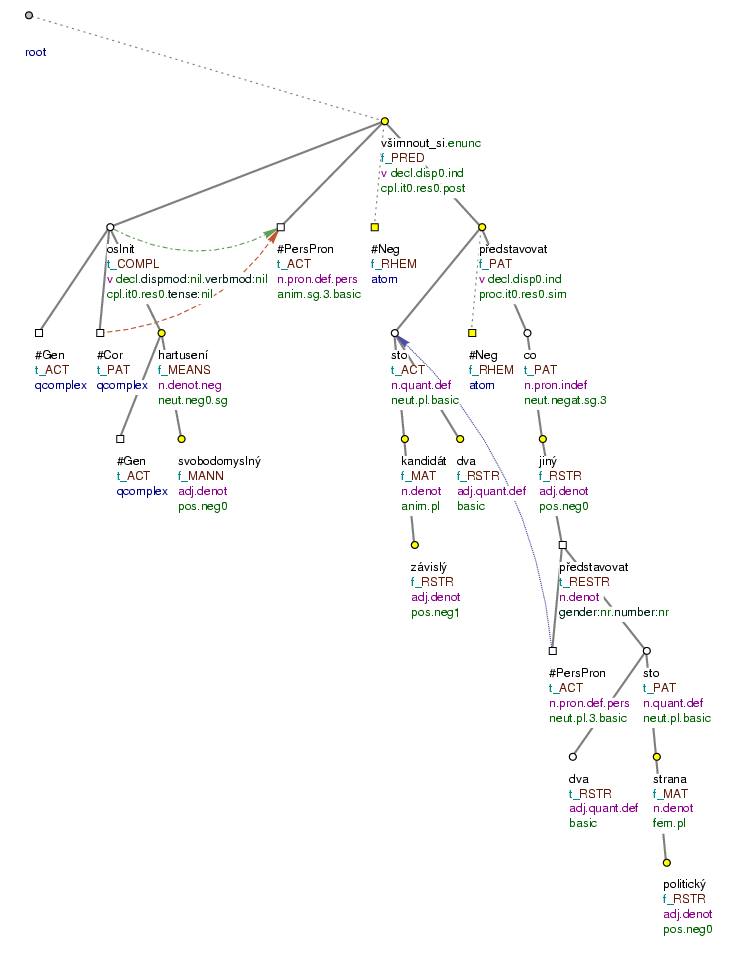
Oslněn svobodomyslným hartusením nevšimne si, že dvě stě nezávislých kandidátů nepředstavuje nic jiného než dvě stě politických stran. (=lit. Amazed (by) liberal clamouring not_notices REFL, that two hundred independent candidates not_presents nothing else than two hundred political parties)
Figure 9.15. Coreference with verbal modifications that have dual dependency
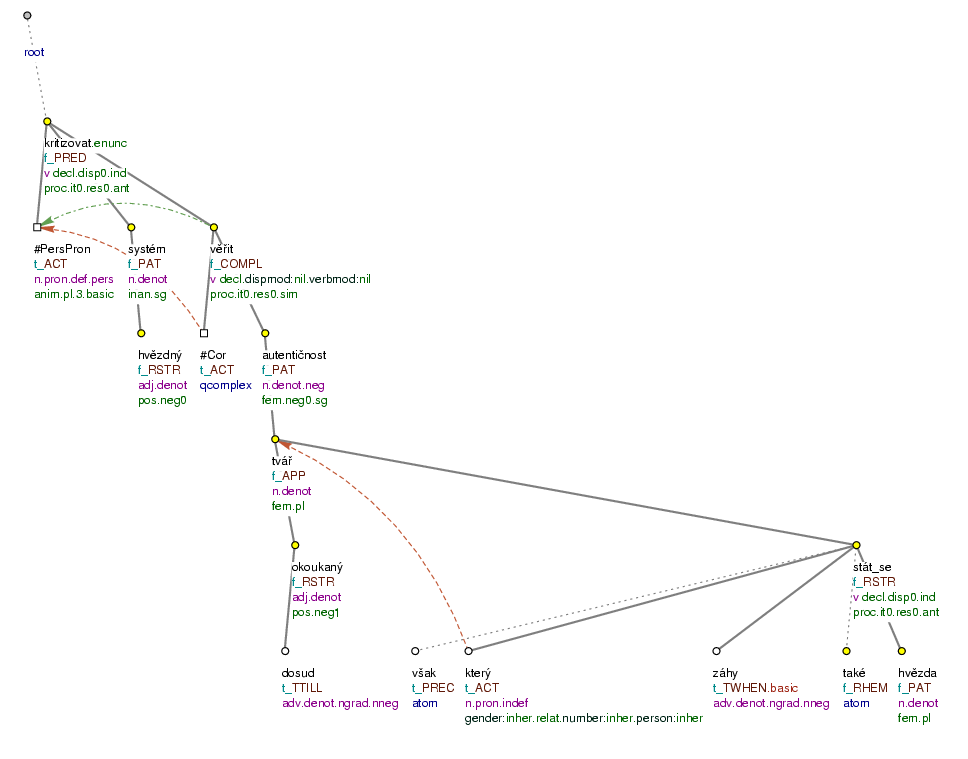
Kritizovali hvězdný systém, věříce v autentičnost dosud neokoukaných tváří, které se však záhy také staly hvězdami. (=lit. (They) criticised star system, believing in authenticity (of) until_now fresh faces, which REFL though soon also became stars)
Figure 9.16. Coreference with verbal modifications that have dual dependency
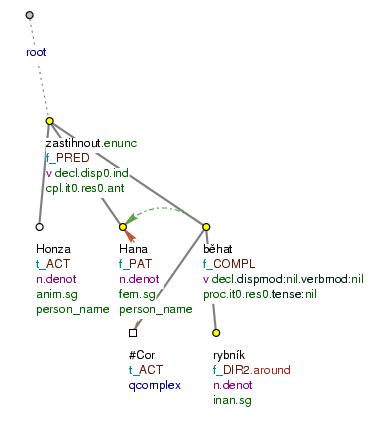
Honza zastihl Hanku běhat kolem rybníka. (=lit. Honza found Hanka run around lake)
Figure 9.17. Coreference with verbal modifications that have dual dependency
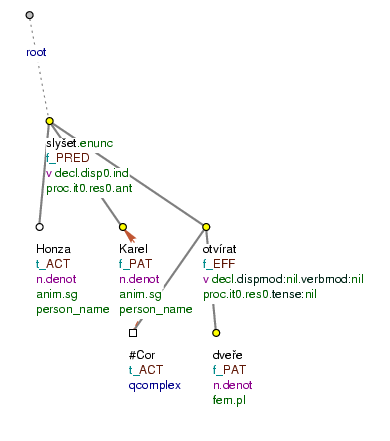
Honza slyšel Karla otvírat dveře. (=lit. Honza heard Karel open door)
Figure 9.18. Coreference with verbal modifications that have dual dependency
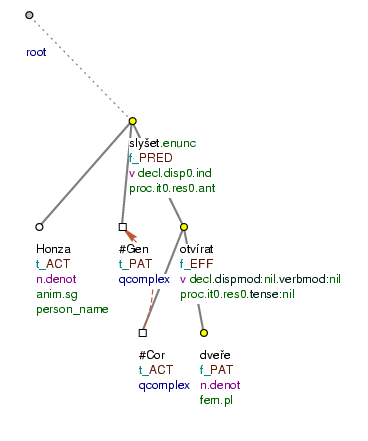
Honza slyšel otvírat dveře. (=lit. Honza heard open door)
Figure 9.19. Coreference with verbal modifications that have dual dependency
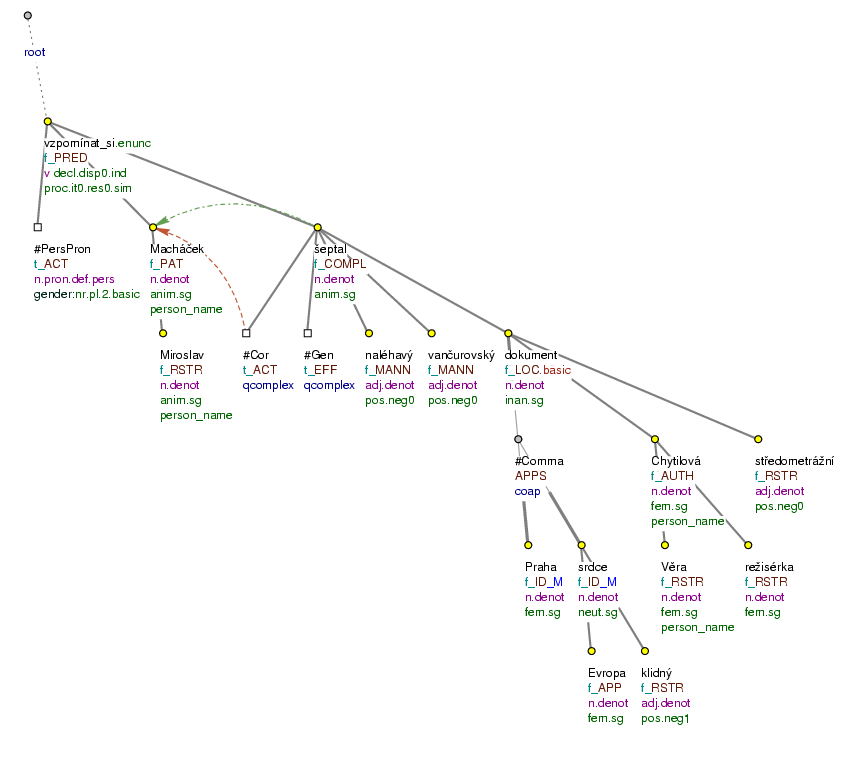
Vzpomínáte si na Miroslava Macháčka, jak naléhavě vančurovsky šeptal ve středometrážním dokumentu Praha, neklidné srdce Evropy režisérky Věry Chytilové? (=lit. (Do you) remember REFL - MM, how urgently Vančura-like whispered in - document Praha, neklidné srdce Evropy (by) director Věra Chytilová?)